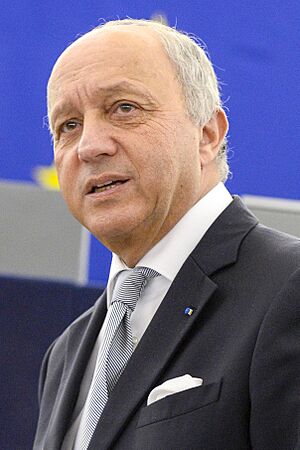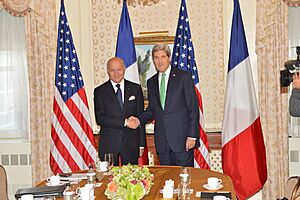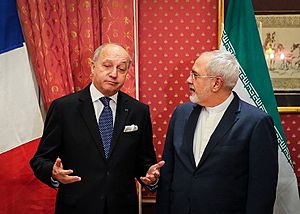Laurent Fabius facts for kids
Quick facts for kids
Laurent Fabius
|
|
|---|---|

Fabius in 2016
|
|
| President of the Constitutional Council | |
| In office 8 March 2016 – 8 March 2025 |
|
| Appointed by | François Hollande |
| Preceded by | Jean-Louis Debré |
| Succeeded by | Richard Ferrand |
| Minister of Foreign Affairs and International Development | |
| In office 16 May 2012 – 11 February 2016 |
|
| Prime Minister | Jean-Marc Ayrault Manuel Valls |
| Preceded by | Alain Juppé |
| Succeeded by | Jean-Marc Ayrault |
| Prime Minister of France | |
| In office 17 July 1984 – 20 March 1986 |
|
| President | François Mitterrand |
| Preceded by | Pierre Mauroy |
| Succeeded by | Jacques Chirac |
| Minister of Finance | |
| In office 28 March 2000 – 7 May 2002 |
|
| Prime Minister | Lionel Jospin |
| Preceded by | Christian Sautter |
| Succeeded by | Francis Mer |
| President of the National Assembly | |
| In office 12 June 1997 – 28 March 2000 |
|
| Preceded by | Philippe Séguin |
| Succeeded by | Raymond Forni |
| In office 23 June 1988 – 22 January 1992 |
|
| Preceded by | Jacques Chaban-Delmas |
| Succeeded by | Henri Emmanuelli |
| Minister of the Budget | |
| In office 22 May 1981 – 23 March 1983 |
|
| Prime Minister | Pierre Mauroy |
| Preceded by | Maurice Papon |
| Succeeded by | Henri Emmanuelli |
| Personal details | |
| Born | 20 August 1946 Paris, France |
| Political party | Socialist Party |
| Spouse |
Françoise Castro
(m. 1981; div. 2002) |
| Domestic partner | Marie-France Marchand-Baylet |
| Children | 3 |
| Education | Lycée Janson-de-Sailly Lycée Louis-le-Grand |
| Alma mater | École Normale Supérieure Sciences Po École nationale d'administration |
Laurent Fabius (born 20 August 1946) is a French politician who has held many important roles in the French government. He was the Prime Minister of France from 1984 to 1986. At 37 years old, he was one of the youngest prime ministers in France's modern history.
Fabius also served as the President of the National Assembly (France's main parliament) twice, from 1988 to 1992 and again from 1997 to 2000. He was the Minister of Finance from 2000 to 2002 and the Minister of Foreign Affairs from 2012 to 2016. Since 2016, he has been the president of the Constitutional Council, which is a special court that checks if laws follow the French Constitution.
Contents
Early Life and Education
Laurent Fabius was born in Paris, France, on August 20, 1946. His parents were Louise and André Fabius. He has an older sister, Catherine, and an older brother, François. His parents came from Jewish families but converted to Catholicism, and Laurent was raised Catholic. He has three sons: David, Thomas, and Victor.
Fabius attended well-known schools in France, including Lycée Janson-de-Sailly and Lycée Louis-le-Grand. He then went on to study at top universities like the École Normale Supérieure, Sciences Po, and the École nationale d'administration. These schools are known for training future leaders and government officials in France.
Political Career
After finishing his studies, Laurent Fabius began working for the Council of State, which advises the French government. He joined the Socialist Party in 1974 and was first elected to the National Assembly in 1978. He quickly became a close associate of François Mitterrand, who was the leader of the Socialist Party at the time.
Early Government Roles: 1981–1984
When François Mitterrand became President of France in 1981, he appointed Laurent Fabius as the Minister of the Budget. This role involved managing the country's money. Two years later, Fabius became the Minister of Industry. In this position, he worked on modernizing French industries. In 1984, President Mitterrand chose Fabius to be the Prime Minister. At 37, he was the youngest French Prime Minister since 1819.
Prime Minister of France: 1984–1986
As Prime Minister, Laurent Fabius promoted a new way of thinking about French socialism. He believed in accepting the market economy and focusing on modernizing industries and increasing productivity.
His government introduced several important social policies:
- A law in 1984 helped families by providing support for orphans and making it easier to get child support payments.
- The government increased financial help for families with three or more children.
- A parental education fund was created in 1985 to support parents who took time off work after having children.
- In 1985, the law was changed to prevent discrimination based on "moral habits," which included protecting the rights of homosexuals.
- An Immigrants' Council was set up in 1984 to discuss issues important to immigrant communities.
- The government also introduced an allowance for parents who took parental leave after the birth of their first child.
In education, Fabius's government invested heavily in improving schools. They provided funds for technical education, trained teachers in computer use, and bought many computers for students. They also reformed universities to focus more on practical skills and new technologies. A vocational baccalaureate (a type of high school diploma focused on job skills) was also created in 1985.
To help with unemployment, the government launched youth training programs in 1984. These programs helped young people gain work experience and training to prepare them for jobs. They also improved benefits for people who had been unemployed for a long time.
During his time as Prime Minister, Fabius faced some challenges. He was involved in a difficult situation related to a health issue, but he was later cleared of any personal wrongdoing. He also had to deal with a situation involving a ship called the Rainbow Warrior, where French secret service agents were involved. Despite his government's efforts, unemployment and social inequality increased, which contributed to the Socialist Party's defeat in the 1986 election. After this, Fabius stepped down as Prime Minister.
Later Political Roles: 1986–2012
After his time as Prime Minister, Laurent Fabius continued to be a major figure in French politics. He served as the President of the National Assembly from 1988 to 1992 and again from 1997 to 2000. He was also elected to the European Parliament in 1989, where he worked to improve cooperation between European parliaments.
From 2000 to 2002, he was the Minister of Economy and Finance in Lionel Jospin's government. After Jospin retired, Fabius hoped to lead the Socialist Party but was unsuccessful. He then became a leader of the left-wing part of the party.
In 2004, he led the "No" campaign within his party against the proposed European Constitution. The "No" vote won in the national referendum in 2005. In 2006, he ran to be the Socialist Party's candidate for president but came in third place.
Minister for Foreign Affairs: 2012–2016
On May 17, 2012, Laurent Fabius became the Minister for Foreign Affairs under President François Hollande. In this role, he was responsible for France's relationships with other countries.
Key moments during his time as Foreign Minister included:
- His stance on the conflict in Syria, where he supported certain rebel groups.
- His leadership as chair of the 2015 United Nations Climate Change Conference in Paris. He was praised for his ability to work with many different countries to reach an important agreement on climate change.


President of the Constitutional Council: 2016–Present
In 2016, President François Hollande chose Laurent Fabius to become the President of the Constitutional Council. He officially took on this role on March 8, 2016. In this position, he helps ensure that new laws follow the French Constitution.
In November 2023, he participated in a march in Paris to speak out against antisemitism, showing his commitment to fighting prejudice.
Political Offices Held
- President of the Constitutional Council: since 2016
Government Roles
- Prime Minister: 1984–1986
- Minister of Budget: 1981–1983
- Minister of Research and Industry: 1983–1984
- Minister of Economy, Finance and Industry: 2000–2002
- Minister of Foreign Affairs: 2012–2016
Elected Positions
- Member of European Parliament: 1989–1992
- President of the National Assembly of France: 1988–1992 / 1997–2000
- Member of the National Assembly of France for Seine-Maritime: 1978–1981, 1986–2000, 2002–2012
- Regional councillor of Upper Normandy: 1992–1995
- General councillor of Seine-Maritime: 2000–2002
- Mayor of Le Grand-Quevilly: 1995–2000
- First Deputy-mayor of Le Grand-Quevilly: 1977–1995 / 2000–2012
- Municipal councillor of Le Grand-Quevilly: 1977–2016
- President of the Agglomeration community of Rouen: 2008–2012
- Vice-president of the Agglomeration community of Rouen: 2001–2008
- Member of the Agglomeration community of Rouen: 2001–2014
Political Party Roles
- First Secretary (leader) of the Socialist Party (France): 1992–1993
Personal Life
Laurent Fabius has three children. He was married to Françoise Castro from 1981 to 2002. He owns several properties, including a flat in Paris and two country houses.
Honours and Awards
Laurent Fabius has received many awards and honours from France and other countries for his public service.
French National Honours
 Grand Cross of the French National Order of Merit (1984)
Grand Cross of the French National Order of Merit (1984) Grand Officer of the Order of the Legion of Honour (2017)
Grand Officer of the Order of the Legion of Honour (2017)
Foreign Honours
 Officer of the National Order of Quebec (Canada) (1986)
Officer of the National Order of Quebec (Canada) (1986) Grand Cross of the Order of Infante D. Henrique (Portugal) (1987)
Grand Cross of the Order of Infante D. Henrique (Portugal) (1987) Knight Grand Cross of the Order of Merit of the Italian Republic (Italy) (1990)
Knight Grand Cross of the Order of Merit of the Italian Republic (Italy) (1990) Grand Cross of the Order of Merit of the Republic of Poland (Poland) (1991)
Grand Cross of the Order of Merit of the Republic of Poland (Poland) (1991) Grand Cross of the Royal Norwegian Order of Merit (Norway) (1995)
Grand Cross of the Royal Norwegian Order of Merit (Norway) (1995) Grand Cross of the Order of the Star of Romania (Romania) (1999)
Grand Cross of the Order of the Star of Romania (Romania) (1999) Commander with Cross with Star of the Order of Polonia Restituta (Poland) (2012)
Commander with Cross with Star of the Order of Polonia Restituta (Poland) (2012) Grand Officer of the National Order of Mali (Mali) (2013)
Grand Officer of the National Order of Mali (Mali) (2013) Honorary Knight Commander of the Order of St Michael and St George (United Kingdom) (2014)
Honorary Knight Commander of the Order of St Michael and St George (United Kingdom) (2014) Grand Decoration of Honour in Gold with Sash of the Decoration of Honour for Services to the Republic of Austria (Austria) (2015)
Grand Decoration of Honour in Gold with Sash of the Decoration of Honour for Services to the Republic of Austria (Austria) (2015) Grand Cross of the Order of Isabella the Catholic (Spain) (2015)
Grand Cross of the Order of Isabella the Catholic (Spain) (2015) Grand Cordon of the Order of the Rising Sun (Japan) (2022)
Grand Cordon of the Order of the Rising Sun (Japan) (2022)
Images for kids
See also
 In Spanish: Laurent Fabius para niños
In Spanish: Laurent Fabius para niños




